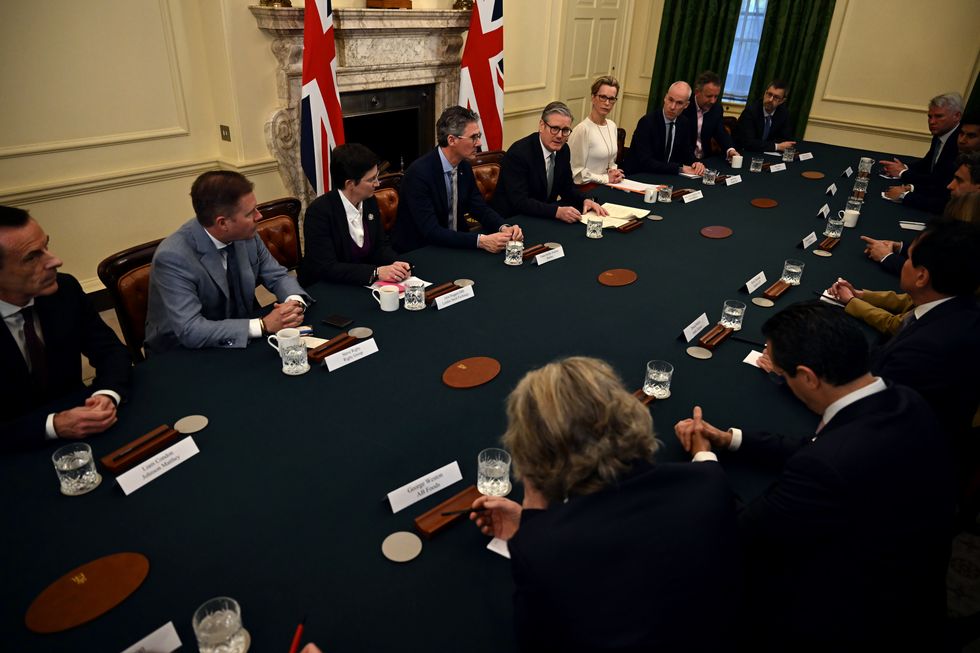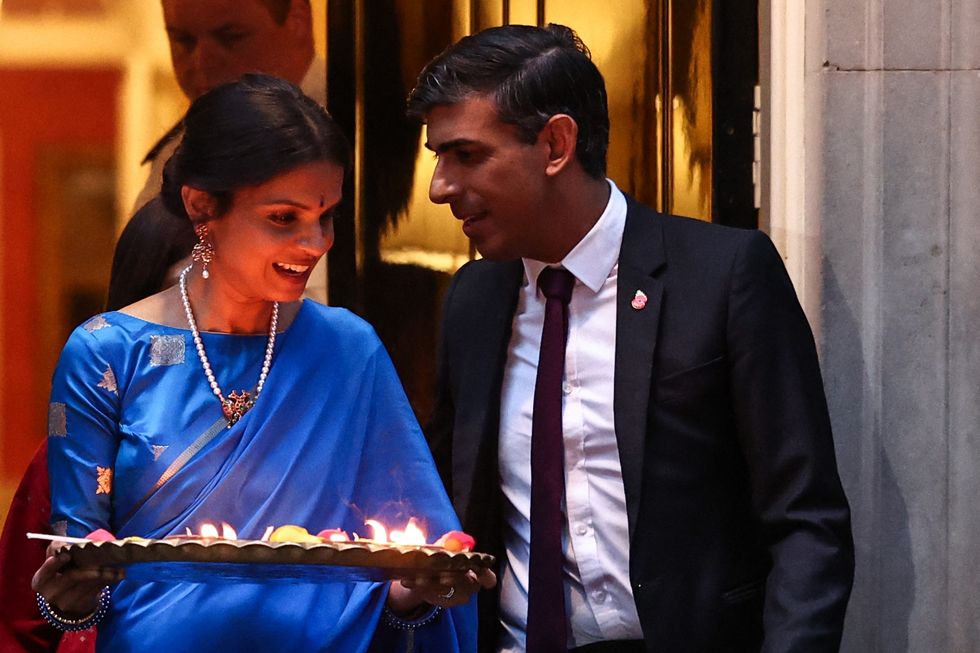PRIME MINISTER Sir Keir Starmer has vowed to “shelter British business from the storm” of global economic disruption, while chancellor Rachel Reeves said the UK was seeking a new economic partnership with the US to reduce tariffs imposed by president Donald Trump.
Starmer on Monday (7) unveiled plans to give auto manufacturers more flexibility in transitioning to electric vehicles in a bid to boost the sector as it battles the higher costs of the US levies.

The world’s auto sector has been hit hard by Washington’s sweeping new levies, which impose a 25 per cent tariff on vehicles imported into the US.
Starmer told staff and journalists at the Jaguar Land Rover factory in the West Midlands that the measures were a “down payment” and not “the extent of the turbo-charging” to help businesses deal with tariffs.
“In the coming days and weeks, we’re going to use industrial policy to shelter British business from the storm,” he added. The prime minister called the levies “a huge challenge” for the future, warning that the “global economic consequences could be profound”.
JLR, owned by India’s Tata Motors, announced last weekend it would “pause” shipments to the US in April as it addressed “the new trading terms”.
Meanwhile, Reeves on Tuesday (8) revealed she would meet US Treasury secretary Scott Bessent “shortly”.
Rachel Reeves spoke to her counterparts in Canada, Australia, Ireland, France, Spain and the European Union. She also held talks with India’s finance minister Nirmala Sitharaman this week as the two sides discuss a free trade agreement.

Speaking in parliament, the chancellor said Trump’s tariffs would have huge implications for the world economy, as seen in global markets this week.
She reiterated her comments that Britain would keep all options open in terms of how it responds to tariffs, but said it did not want to create more trade barriers.
“This morning, I spoke to the governor of the Bank of England, who has confirmed that markets are functioning effectively and that our banking system is resilient,” Reeves MPs.
Discussing how the government would respond, she said: “All of the decisions that we make as a government will be underpinned by the stability of our nonnegotiable fiscal rules”.
Experts and industry stakeholders have pinned hopes on bilateral trade agreements with the US and its trade partners to offset negative impacts of tariffs. They said nobody is a winner in a trade war.
Olivia O’Sullivan, director, UK in the World Programme, at Chatham House, a UK-based thinktank, said it appeared that the UK had swerved the worst treatment this week via a strategy of “flattery and offering concessions.”
She told Eastern Eye, “There’s little predictability in Trump’s approach, no indication the UK was given any specific ‘discount’, and the wider effect of these tariffs on the global economy are still likely to substantially affect the UK.
“There is no clarity about how the Trump administration arrived at the figure or why they see their 10 per cent rate as ‘reciprocal’ as a result.
“Even if the direct hit on the UK is relatively lower, this volatility will affect the country, because it will likely affect consumer and investor confidence, global prices, and trade. Countries which are affected will face higher prices, and these will likely be passed on to UK consumers and businesses via global supply chains. And, if the tariffs hurt economic growth in key markets, then the wider global economic slowdown will affect Britain.
“The UK may have avoided the worst in direct tariffs, but the wider hit to economic certainty and trust is significant.”
On a potential UK-US trade deal, O’Sullivan, said, “A strategy of seeking a bespoke deal with the US may yet pay off and may have broadly put the UK in the ‘least-worst’ category this time around, but this does not mitigate against the wider effects on the global economy of Trump’s approach. The UK has few options though, and may need to continue to try to balance its relations with the US, Europe and China.
“The volatility of the Trump administration means it is difficult for the UK to appeal to the US when it is not clear what the US’s economic goals currently are. A strategy of emphasising the UK’s own relatively balanced trade with the US may not have a lasting effect – while the Trump administration suggests they seek to ‘punish’ countries buying less from the US than they sell.
She added, “The UK is stuck with an unpredictable negotiating partner, and while it can try to win exemptions, it still needs to plan to use other growth levers to offset the potential effects of tariffs. This could include seeking a better trade relationship with the EU, or deepening ties with other key trade partners.
“The UK may yet secure a trade or sector-specific deal with the US, but given the Trump administration’s tendency to revisit and rewrite deals even Trump secured in his first term, there are limits to the benefits and certainty the UK might secure from any given deal.”
India reacted cautiously last Thursday (3) to Trump’s sweeping tariffs, with the government saying it was examining both “implications” and “opportunities” from the duty hikes.
Trump, speaking while unveiling the tariffs at the White House the previous day (2), said India’s prime minister Narendra Modi was a “great friend”, but that he had not been “treating us right”.
India’s Department of Commerce said last Thursday it is “carefully examining the implications of the various measures”.
It also added in a statement that it was “studying the opportunities that may arise due to this new development”, a likely reference to regional competitors being hit harder.
An initial White House chart revealing the tariffs listed India at 26 per cent, but an annexe cited by New Delhi put the duties at 27 per cent.
Indian exporters said they were disappointed and relieved in equal measure.
Ajay Sahai, director general of the Federation of Indian Export Organisations, said the tariffs on India were higher than expected and would hurt export demand.
But Sahai also pointed out that India was hit with lower levies than manufacturing rivals.
“Many countries which we compete with globally, including China, Indonesia, and Vietnam etc, have been hit harder than us,” he said.
“That opens up space for us to gain in terms of market share. But at the same time, if more countries retaliate and global trade gets hurt, this isn’t good for anyone.”
According to the Global Trade Research Initiative (GTRI), the US decision to impose a 26 per cent reciprocal tariff on India could lead to a decline of $5.76 billion (£4.42bn), translating into a 6.41 per cent contraction in exports to Washington in 2025.
The contraction will be led by a drop in exports of fish, which may fall by a fifth, followed by iron and steel; diamonds, gold; vehicles and parts; electrical, telecommunications, and electronic products.

In 2024, India exported $89.81bn (£68.88bn) worth of goods to the US.
A White House fact sheet said pharmaceutical goods would be exempt from the reciprocal tariffs, providing relief to an Indian industry that shipped more than $8bn (£6.2bn) in exports to the United States in the 2024 fiscal year.
Indian Pharmaceutical Alliance secretary general Sudarshan Jain said this showed “the critical role of cost-effective, life-saving generic medicines in public health, economic stability and national security”.
Trump’s tariffs are the single biggest disruptor in world order since the second World War, according to Dr VK Vijayakumar, chief investment strategist at Geojit Financial Services Limited, an Indiabased brokerage firm.
“The curious case is that the US has imposed tariffs on its friends and partners, including Canada, Mexico and the EU. The tariff calculation itself is flawed. Trump imposed a 26 per cent tariff on India, however, a UN report last year said the average tax on US goods imported to India is just 17 per cent.”
Vijayakumar added, “One thing the US president missed is that the US economy is 68 per cent consumption based. With the tariffs, the prices of almost every product would go up, which ultimately will lead to inflation. When the economy slows down, the country will experience stagflation, which is indeed a dangerous situation for not only the US, but across the world.”
He said, “India started trade talks with the US two months ago. It will take another two-three months to finalise. So, the uncertainty regarding tariffs will continue.”
Agneshwar Sen, trade policy leader at EY India, told Eastern Eye, “For India, the additional tariff places it in the lower half of targeted countries, creating opportunities beyond traditional export sectors like engineering goods, electronics, gems and jewelry, textiles, and apparel.
“The tariffs could also shift competitiveness in India’s favour in sectors where other regional exporters are more severely impacted. To maximise this advantage, India must not only negotiate with the US to maintain market access, but also collaborate with free trade agreement (FTA) partners in Asia to restructure supply chains and seize new opportunities.
Alex K Ninan, vice president of the Seafood Exporters Association of India, told Eastern Eye, “The industry got badly affected by the tariff announcement. As many as 35 per cent of seafood exports from India goes to the US. We will have to find alternative markets in Europe, Japan, and South Korea.”
He added, “A major issue we are facing now is that Ecuador, which is India’s biggest competitor in the sector, faces only a 10 percent tariff. So, India’s right to a level playing field is now gone with the 26 per cent tariff imposed on us. This will adversely affect our seafood exports, especially shrimp exports.”
“I was part of a delegation which met with the central government about these tariffs this week,” Ninan added.
“The ministry informed us that talks are ongoing regarding a bilateral trade agreement with the US. India hopes that in two to three months’ time, there will be clarity on the discussions.
(with inputs from agencies)


















 Rishi Sunak and Akshata Murty. (Photo by HENRY NICHOLLS/AFP via Getty Images)
Rishi Sunak and Akshata Murty. (Photo by HENRY NICHOLLS/AFP via Getty Images) 

